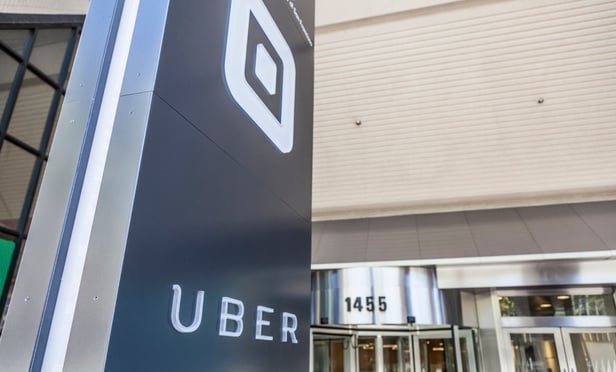 Uber headquarters in San Francisco
Uber headquarters in San Francisco
(Credit: Jason Doiy)
Alphabet Inc. must place extremely high value on its driverless car technology.
That was the takeaway from Silicon Valley lawyers and academics a day after Alphabet subsidiary Waymo LLC sued Uber Technologies Inc., alleging stolen trade secrets and patent infringement.
- RELATED ARTICLE: Alphabet Taps Quinn Emanuel in Suit Over Driverless Cars
Valley lawyers noted that Alphabet, Google Inc. and its subsidiaries aren’t in the habit of bringing IP lawsuits, or litigation generally. “I actually can’t remember the last time Google was the plaintiff in a lawsuit,” said Santa Clara University law professor Eric Goldman. The only exceptions he said came to mind were declaratory judgment actions in patent cases, which are defensive in nature.
A search of RPX Corp.’s patent litigation database yielded one Google suit, a 2013 action against BT Americas Inc., aside from a handful of DJ actions.
Thursday’s suit also raised eyebrows because Google Ventures invested $250 million in Uber just a few years ago.
Suits between strategic partners are unusual but not unheard of in Silicon Valley. Goldman pointed to eBay’s 2008 suit against Craigslist as a famous example. Another lawyer noted that Yahoo maintained a suit against Google in the runup to Google’s 2004 IPO notwithstanding Yahoo’s early investment in its search rival.
“As long as there’s less than 100 percent ownership, there’s a risk the strategic partner is going to go sideways,” Goldman said.
In the end, he said, Alphabet likely made a business decision that “they would rather have the entity that they have 100 percent ownership in succeed.”
Baker Botts IP partner G. Hopkins Guy III said Alphabet appears to have run up a big lead in driverless car technology, and is guarding its time advantage to market. “That’s really what a trade secret is,” he said.
 Charles Verhoeven
Charles Verhoeven
In Waymo’s telling, Uber’s leaders have become obsessed with being the first to market. Waymo’s complaint, signed by Quinn Emanuel Urquhart & Sullivan partner Charles Verhoeven, quotes Uber CEO Travis Kalanick telling Business Insider last year that if Apple or Google were to beat him to it, “then Uber is no longer a thing.”
Waymo manager Anthony Levandowski was also chafing at Google’s painstaking approach to developing and road-testing the technology that enables cars to “see” and react to their surroundings, according to Waymo’s complaint. Waymo says it is “informed and believes” that Levandowski attended meetings with “high-level executives” at Uber on Jan. 14, 2016. Over the next two weeks Levandowski resigned from Waymo and formed his own driverless vehicle venture, taking thousands of confidential computer files with him, Waymo alleges. Uber acquired Levandovski’s company last summer for $680 million, according to the complaint.
Uber said Thursday that it takes the allegations seriously and is reviewing them.
Waymo goes into considerable detail about its investigation into Levandowski’s alleged theft, contending that he installed special software on a laptop computer to download 9.7 gigabytes of “sensitive, secret and valuable internal Waymo information,” then reformatted the device to cover his forensic fingerprints. Waymo alleges it confirmed the theft through two sources: an inadvertent email sent from a vendor and a public records request from Nevada regulatory authorities. Both show that Levandowski’s company and now Uber are using laser-based scanning and mapping technology that bear “a striking resemblance to Waymo’s own highly confidential and proprietary design,” Waymo says.
Coincidentally, Alphabet and Google just extricated themselves from a high-profile trade secrets suit against them on the grounds that the plaintiff did not allege the theft with sufficient particularity.
Space Data, an Arizona company that says it pioneered a method of providing wireless connectivity via a fleet of high-altitude balloons, accused Google last year of misappropriating its data on stratospheric wind patterns that it gathered through hundreds of thousands of flight hours.
“Space Data simply lists vague categories of information that it claims are its ‘confidential information and trade secrets’ and asserts that it is ‘informed and believes’ that Google improperly used that information to develop ‘Project Loon,’” Google argued in its motion to dismiss.
U.S. District Judge Beth Labson Freeman of San Jose agreed with Google earlier this month, dismissing Space Data’s trade secret claim but granting it leave to amend.
Scott Graham writes about intellectual property and the U.S. Court of Appeals for the Federal Circuit. Contact him at [email protected]. On Twitter: @ScottKGraham




